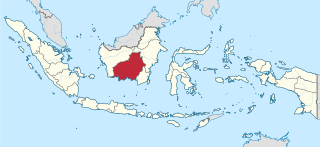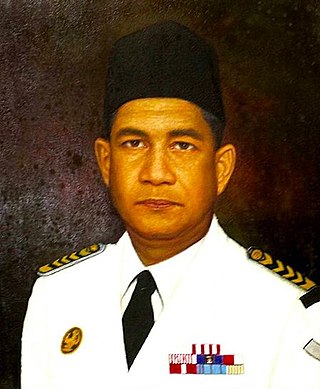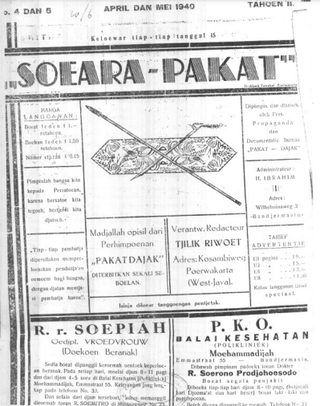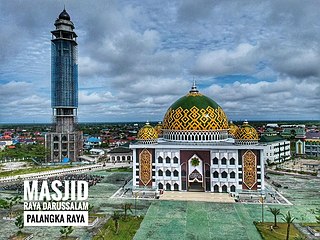Related Research Articles

The Dayak or Dyak or Dayuh are one of the native groups of Borneo. It is a loose term for over 200 riverine and hill-dwelling ethnic groups, located principally in the central and southern interior of Borneo, each with its own dialect, customs, laws, territory, and culture, although common distinguishing traits are readily identifiable. The Dayak were animist in belief; however, since the 19th century there has been mass conversion to Christianity as well as Islam due to the spreading of Abrahamic religions.

West Kalimantan is a province of Indonesia. It is one of five Indonesian provinces comprising Kalimantan, the Indonesian part of the island of Borneo. Its capital and largest city is Pontianak. It is bordered by East Kalimantan and Central Kalimantan to the east, the Malaysian state of Sarawak to the north, and the Pacific Ocean to the west and the Java Sea to the south. The province has an area of 147,307 km2, and had a population of 4,395,983 at the 2010 Census and 5,414,390 at the 2020 Census; the official estimate as at mid 2022 was 5,541,376. Ethnic groups include the Dayak, Malay, Chinese, Javanese, Bugis, and Madurese. The borders of West Kalimantan roughly trace the mountain ranges surrounding the vast watershed of the Kapuas River, which drains most of the province. The province shares land borders with Central Kalimantan to the southeast, East Kalimantan to the east, and the Malaysian territory of Sarawak to the north.

South Kalimantan is a province of Indonesia. It is the smallest province in Kalimantan, the Indonesian territory of Borneo. The provincial capital was Banjarmasin until 15 February 2022 when it was legally moved to Banjarbaru. The population of South Kalimantan was recorded at just over 3.625 million people at the 2010 Census, and at 4.07 million at the 2020 Census. The official estimate as at mid 2022 was 4,182,080. One of the five Indonesian provinces in Kalimantan, it is bordered by the Makassar Strait in the east, Central Kalimantan in the west and north, the Java Sea in the south, and East Kalimantan in the north. The province also includes the island of Pulau Laut, located off the eastern coast of Kalimantan. The province is divided into 11 regencies and 2 cities. South Kalimantan is the traditional homeland of the Banjar people, although some parts of East Kalimantan and Central Kalimantan are also included in this criteria. Nevertheless, South Kalimantan, especially the former capital city Banjarmasin has always been the cultural capital of Banjarese culture. Many Banjarese have migrated to other parts of Indonesia, as well as neighbouring countries such as Singapore and Malaysia. In addition, other ethnic groups also inhabit the province, such as several groups of the Dayaks, who mostly live in the interior part of the province, as well as the Javanese, who mostly migrated from Java due to the Transmigration program which dated from the Dutch colonial era.It is one of the provinces in Indonesia that has a larger population than Mongolia.

Central Kalimantan is a province of Indonesia. It is one of five provinces in Kalimantan, the Indonesian part of Borneo. It is bordered by West Kalimantan to the west, South Kalimantan and East Kalimantan to the east, Java Sea to the south and is separated narrowly from North Kalimantan and Malaysia by East Kalimantan's Mahakam Ulu Regency. Its provincial capital is Palangka Raya and in 2010 its population was over 2.2 million, while the 2020 Census showed a total of almost 2.67 million; the official estimate as at mid 2022 was 2,741,075.

Palangka Raya is the capital and largest city of the Indonesian province of Central Kalimantan. The city is situated between the Kahayan and the Sabangau rivers on the island of Borneo. As of the 2020 census, the city has a population of 293,500; the official estimate as at mid 2022 was 305,907. Palangka Raya is the largest city by land area in Indonesia. Most of the area is forested including protected forests, nature conservation areas, and Tangkiling Forest). It also has the highest Human Development Index rating of any city in Kalimantan.

Mandau is the traditional weapon of the Dayak people of Borneo. It is also known as Parang Ilang among the Bidayuh, Iban and Penan people, Malat by the Kayan people or Baieng by the Kenyah people or Bandau by Lun Bawang or Pelepet/Felepet by Lundayeh. Mandau is mostly ceremonial. However, a less elaborate version called Ambang is used as an everyday practical tool.

The Banjar or Banjarese are an Austronesian ethnic group native to the Banjar regions in the southeastern Kalimantan regions of Indonesia. Nowadays, Banjarese diaspora can be found in neighbouring Banjar regions as well; including Kotabaru Regency, the southeastern regions of Central Kalimantan, southernmost regions of East Kalimantan, and some provinces of Indonesia in general. The Banjarese diaspora community also can be found in neighbouring countries of Indonesia, such as Brunei, Malaysia, and Singapore.

Gunung Mas Regency is one of the thirteen regencies of Central Kalimantan Province, Indonesia. The regency seat is located at the town of Kuala Kurun in Kurun District. The population of Gunung Mas Regency was 96,900 at the 2010 census ; and 135,373 at the 2020 census; the official estimate as at mid 2022 was 142,309.

Anakletus Tjilik Riwut was an Indonesian military officer and journalist who served as the governor of Central Kalimantan from 1959 to 1967. He participated in the Indonesian National Revolution, becoming one of the leaders of the Kalimantan Physical Revolution in Dutch Borneo. In 1988, the government of Indonesia declared him a national hero.

Muara Teweh is the regency seat of North Barito Regency and also one of the towns in Central Kalimantan. This town is at a distance of 350 km northeast of Palangka Raya city, the capital of Central Kalimantan Province. This town is situated mainly in 2 sub-districts i.e. the sub-district of Lanjas and the sub-district of Melayu located in the district of Central Teweh. The population of this town is roughly 46,652 people as of 2021.

The Islamic Defenders Front was an Indonesian hardline Islamist organization founded in 1998 by Muhammad Rizieq Shihab with backing from military and political figures. Since 2015, Ahmad Shabri Lubis has been the organization's leader, while Rizieq Shihab holds the title of Grand Imam of the FPI for life. The FPI originally positioned itself as an Islamic religious police, mostly by conducting illegal and unauthorized vigilante operations. It also acted as an Islamist pressure group with prominent social media activism and mass mobilizations against pro-government activists, ethnic Chinese, Christian minority, as well as liberal and reformist politicians.
Jamaah Ansharut Daulah is an Indonesian group that has been reported to be linked to the 2018 Surabaya bombings as well as the 2019 Jolo Cathedral bombings. The Islamic State of Iraq and the Levant (ISIL) has been reported as claiming responsibility for both attacks. The group had been identified by the United States Department of State as a terrorist organization in 2017. It is banned by Iraq and Indonesia. It is also listed as a terrorist organization by the United Nations Security Council on 4 March 2020.

The Kalimantan Physical Revolution was an armed conflict between Indonesian nationalists in and pro-Dutch forces in Dutch Borneo following the end of the Japanese occupation of the Dutch East Indies and the 1945 Proclamation of Indonesian Independence by Sukarno and which lasted until the Dutch withdrew from most of Indonesia in 1949. It can be considered a regional conflict in the larger Indonesian National Revolution. After the surrender of the Japanese at the end of World War II, allied forces took control of the Dutch East Indies, including Dutch Borneo. The return of Dutch authorities however, was rejected by majority of native population, including in Borneo, resulting in various regional armed conflicts between Royal Netherlands East Indies Army and Indonesian nationalist forces. Allied military forces in Borneo were in a strong position after an early conflict in August 1945, and were able to pacify local nationalist uprisings and impose a blockade to prevent military aid and exchange in personnel from nationalist strongholds in Java and Sumatra. Later, nationalists with connections to Borneo were able to breach tofhe military blockade to provide information revolutionary events in Java and Sumatra, declaring Kalimantan as inseparable part of the new Indonesian republic.

The Forum Betawi Rempug (FBR) is a Betawi mass organization (ormas) based in Jakarta. The group was established on July 29, 2001, by two Betawi kyais Fadloli El Muhir and Lutfi Hakim. The FBR aims to champion the political rights of the Betawi people, an indigenous but marginalized ethnic group based in Jakarta. Today, the FBR has set up over 300 branches in the Jakarta metropolitan area (Jabodetabek) with each at least 100 active memberships.
National Dayak Customary Council is an official customary council of the Dayak people in Indonesia that acts as the highest authority over other cultural or traditional councils of the Dayak people. It has branches from the provincial level to the village level in the entire Kalimantan and is funded by the Indonesian government. It was established on 5 September 2006 after the 2nd National Indonesian Dayak Conference in Pontianak regarding matters of funding the organization and its structure, and has been incorporated into laws by various local governments in Kalimantan. The president of the council is elected by representatives of regional branches for a five year term. The current president of the council from 2021 to 2026 is Marthin Billa, who was previously regent of Malinau Regency and chief of the North Kalimantan provincial Dayak Council.
Batamad, abbreviation from Barisan Pertahanan Masyarakat Adat Dayak, is an official paramilitary under National Dayak Customary Council in Indonesia. It was established in February 2012 with approval of Central Kalimantan provincial government based on Regional Law Number 16 of 2008. Initially, it was created as a response of rising religious extremism in Indonesia, including Central Kalimantan, and the paramilitary was tasked to supervise suspicious religious activities there, particularly those allegedly by Islamic extremism. Other than that, the organization is also tasked to enforce customary laws under Dayak culture, enforcing tribal land claims, as well as protecting rights of Dayak people. It is proposed in 2018 by Central Kalimantan province that the organization would also act as a security personnels during tribal courts. However, outside of its given legal authorities, the organization also participate in enforcing road traffic with Indonesian National Police. The organization has been descibred by local media as an "official tribal police".
Kema Muhammad Aini Usop, or more popularly known as KMA Usop, was an Indonesian academician, politician, Dayak cultural figure, and former political prisoner during the early Reformasi era. He was famous for being accused as a provocator encouraging native Dayaks to kill Madurese migrants in Central Kalimantan, igniting the communal Sampit conflict in 2001. As a result, he was arrested and prevented from leaving the city of Palangka Raya, making him a city prisoner.

Dayak in politics refers to the participation of Dayaks to represent their political ideas and interests outside of their community. The movement has continued to have a profound impact on the development of Indonesia and Malaysia, especially in Kalimantan and Sarawak.

Hausman Baboe was a colonial head of Kuala Kapuas district of Central Kalimantan in the Dutch East Indies; he was also an early Dayak journalist and an Indonesian nationalist. Baboe was born into an aristocratic family of Dayak Ngaju people and served as head of Kuala Kapuas under the Dutch colonial government but was dismissed from his post due to his anti-colonial remarks. He became a prominent Dayak political figure and was several times accused of being a communist due to his close association with the left-wing political party Sarekat Rakjat. Despite being a Christian, his Indonesian nationalist ideals drew him close to Sarekat Islam.

Darussalam Grand Mosque, Palangka Raya is one of the mosques in Central Kalimantan. This grand mosque is located on George Obos Street in the district of Jekan Raya, Palangka Raya. This mosque is situated within the Islamic Center area of Palangka Raya. This grand mosque is also one of the most important icons of the capital city of Central Kalimantan province.
References
- ↑ "Transformasi identitas gerakan dari "Penambang" menjadi masyarakat adat" (PDF).
- ↑ "Christian Simbar Pejuang Dayak yang Melegenda". beritagar.id. Retrieved 2021-06-07.
- 1 2 3 4 5 6 van Klinken, Gerry (2006-04-01). "Colonizing Borneo: State-Building and Ethnicity in Central Kalimantan". Rochester, NY. SSRN 1876543.
{{cite journal}}: Cite journal requires|journal=(help) - ↑ "BIM 8 2019 1" (PDF).
- ↑ "Gubernur Kukuhkan Pengurus DPP Angkatan Penerus Perjuangan Gerakan Mandau Talawang Pancasila". www.borneonews.co.id. Retrieved 2021-06-07.
- 1 2 Febriyana, Wahyu. "Website Kalimantan Tengah". kalteng (in Indonesian). Retrieved 2021-06-07.
- 1 2 3 "Dinas Kebudayaan dan Pariwisata » 2013 » Maret" (in Indonesian). Retrieved 2021-06-07.
- 1 2 3 Schiller, Anne (22 May 1997). Small Sacrifices: Religious Change and Cultural Identity among the Ngaju of Indonesia. Oxford University Press. pp. 137–139. ISBN 978-0-19-535732-5.
- ↑ "Ethnic fascism in Borneo". Inside Indonesia. Retrieved 2021-06-07.
- ↑ BRP, Red. "GMTPS Menolak Penetapan Pimpinan DPRD Non Dayak". Baritorayapost.com. Retrieved 2021-06-07.
- ↑ "Polresta Palangka Raya Kawal Deklarasi Damai Ormas Sekota Palangka Raya". ANALISNEWS (in Indonesian). 2020-12-31. Retrieved 2021-06-07.
- ↑ "Beberapa Ormas di Pulang Pisau Tolak FPI". Tribun Kaltim (in Indonesian). Retrieved 2021-06-07.
- ↑ "Penyebab Orang Dayak Terus Suarakan Pembubaran FPI".
- ↑ DayakTV (2020-11-27). "ORMAS DAYAK KALIMANTAN TENGAH TOLAK FPI". Dayak TV | TOH IYE (in Indonesian). Retrieved 2021-06-07.